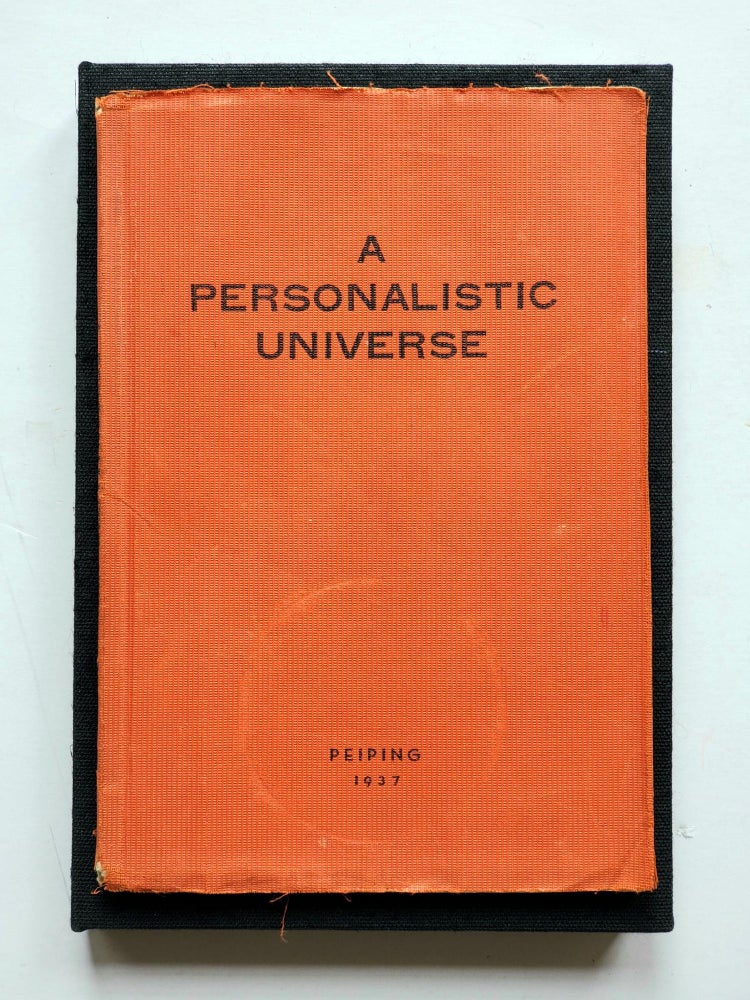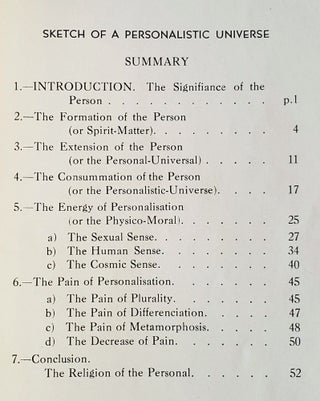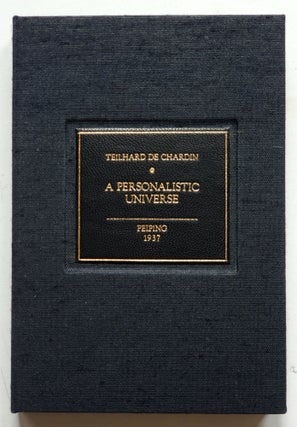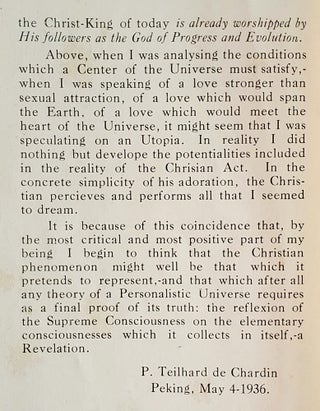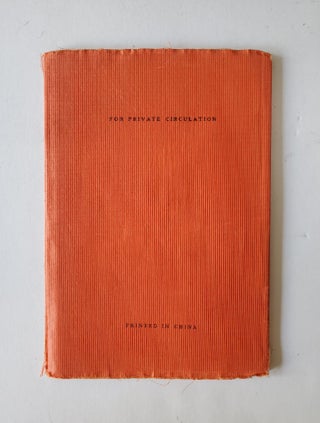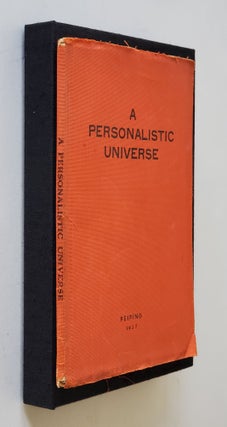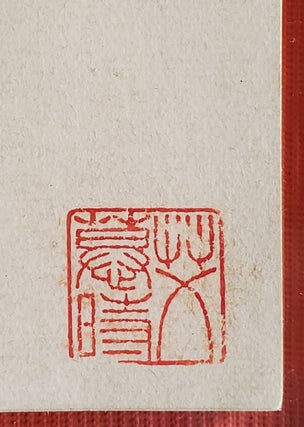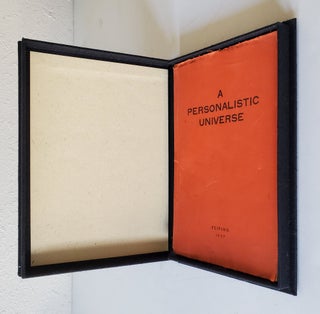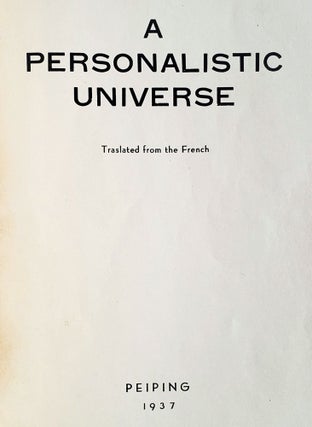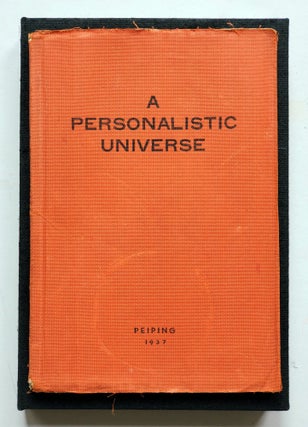A Personalistic Universe; Translated from the French
Peiping: 1937. Original soft orange cloth (7 7/8 inches tall) wrappers over stiff card, lettered in black. Faint cup ring, minor creasing, modest wear to corners, fraying to edges of original cloth. Very good indeed, now housed in a custom clamshell box. Item #1291
"CHRISTIANITY IS NOTHING MORE NOR LESS THAN THE BELIEF IN A UNIFICATION OF THE WORLD IN GOD THROUGH THE INCARNATION"
Rare first English translation of A Personalistic Universe—Pierre Teilhard de Chardin's early attempt to integrate Science and Theology. Privately printed in Peking—and published without approbations—during the French Jesuit's long exile in China, this anonymous essay appeared more than two decades before the posthumous deluge of Teilhard's suppressed writings. Scarce in the bright original cloth wrappers (dated "Peiping / 1937 / For Private Circulation / Printed in China").
In 1925, Teilhard de Chardin was removed from his teaching position in France by the Superior General of the Society of Jesus for his controversial statements regarding evolution. Forbidden to teach or publish—and effectively silenced—the French Jesuit departed for China. Exiled from the European theological limelight, "copies of Teilhard's writings were passed from hand to hand among a select audience of friends and fellow Jesuits. But he was repeatedly denied permission to have them published. Although he was never formally condemned, his career was continuously frustrated and clouded by the disapproval of Rome" (Robert Ellsberg). Teilhard did not leave the Jesuits but, regarding himself as a "Pilgrim of the Future," he instead began to build a legacy. "Teilhard's literary approach reflected his confidence in progress. Rather than arguing for or against evolution, he sought to look forward in time and write for generations of readers who would accept evolution as self-evident. Rather than defending himself, he strove to balance the theoretical and the personal, the orthodox and the visionary, knowing that he would not be around to explain his work" (Paul Elie).
First published in French ("Esquise d'un univers personnel") a year earlier, the author is identified only at the conclusion ("P. Teilhard de Chardin / Peking, May 4-1936"). A Personalistic Universe consists of seven sections: 1. Introduction. The Significance of the Person, 2. The Formation of the Person (or the Personal-Universal), 3. The Extension of the Person (or the Personalistic Universe), 4. The Consummation of the Person, 5. The Energy of Personalisation, 6. The Pain of Personalisation, 7. Conclusion. The Religion of the Personal. "Ever since the birth of thought," Teilhard says, "men have been incessantly wondering and discussing about the co-existence and the opposition of matter and spirit." Thus, Teilhard began to develop his concept of "the Omega Point—the horizon in which spirit and matter must eventually converge" (Ellsberg).
Finding sanctuary in New York, Teilhard was in residence at the Church of St. Ignatius Loyola on Park Avenue when he died of a heart attack on Easter Sunday 1955. Teilhard is buried in the cemetery for the New York Province of the Jesuits at the (now former) novitiate at St. Andrew-on-Hudson in Hyde Park, New York. It was only after his death that his work was made available, leading to a steady stream of "new" books by and about Teilhard throughout the late 1950's and 60's. Teilhard de Chardin became a cultural phenomenon (Time magazine dubbed him the "Aquinas of the Atomic Age") but despite the popular acclaim, Teilhard was often scorned by fellow scientists and the Vatican continued to regard him with suspicion. In 1962, the Congregation for the Doctrine of the Faith issued a monitum (warning) regarding Teilhard's works. Slowly, the Church's position began to thaw until Teilhard was quoted approvingly by both Pope Benedict XVI and Pope Francis (in his encyclical Laudato Si). Privately printed—without ecclesiastical approbations—in an unnumbered but undoubtedly small limitation. Rare, only two copies located in a recent OCLC search. Ellsberg. All Saints: Daily Reflections on Saints, Prophets and Witnesses for Our Time. Elie. The Life You Save May Be Your Own: An American Pilgrimage.
Price: $1,650.00

